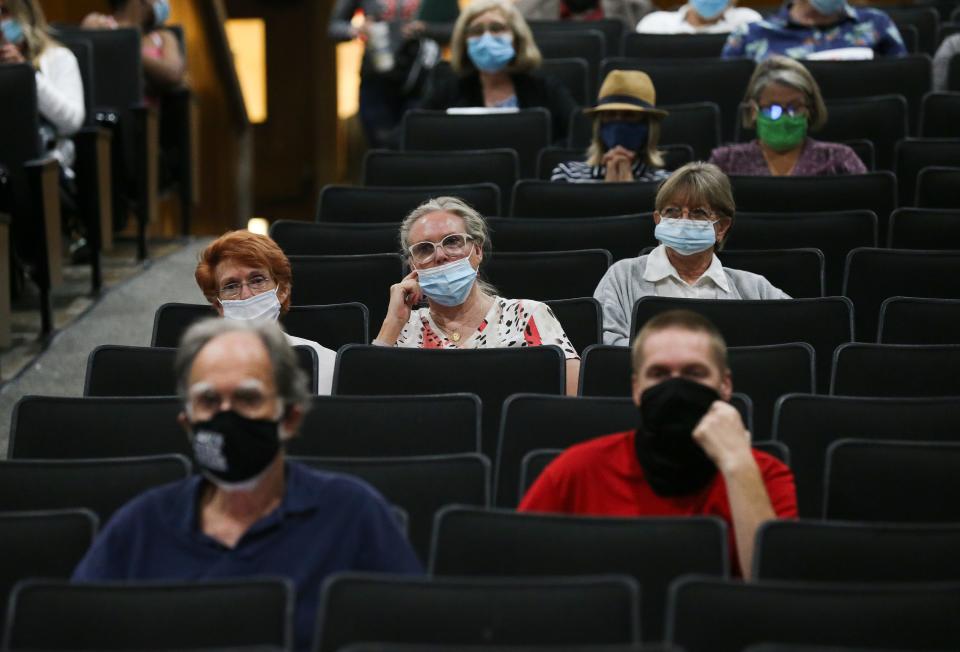How COVID-19 prompted more parental engagement in education | Opinion
While the coronavirus wreaked havoc on Kentucky’s education performance, it also resulted in many parents engaging in where and how their children are educated.
Such parental engagement is a priority for reversing Kentucky’s education slide and ensuring many more of our students are prepared for success beyond their formative school years – whether that be in college or beginning a career.
The results from this fall’s ACT – which assesses the state’s high school graduates’ readiness for their next season by determining their ability to reach benchmark scores in English, math, reading and science – indicate more educational opportunities are needed that impact students long before they don their caps and gowns.
Almost half our graduates were unable to meet the readiness-benchmark score in even one of the four academic areas; fewer than one in five demonstrated satisfactory preparedness in all four subjects.

More: Louisville is sacrificing poor schools to ensure its elite magnet programs thrive
More: Kids are 'cast aside': Readers say JCPS must change magnet programs. Here's how
The pandemic’s pummeling of educational attainment, especially affected our minority students.
Only 431 out of 3,783 Black students, or 11.4%, demonstrated proficiency in the 2021 11th grade ACT math results, which matters not only for the college bound, but also for many graduates wanting to step right into workplaces increasingly filled with modern technology requiring solid mathematical skills.
In a 2015 analysis of research showing how its scores relate to preparing those who choose to pursue careers without following the traditional college track, ACT, Inc. emphasized: “Graduates need this level of readiness if they are to succeed in college-level courses without remediation and to enter workforce training programs ready to learn job-specific skills.”
Considering it’s not unusual for a skilled graduate to trade his graduation garb for a welding cap and the high-five or even six-figure income that often comes with it – without the prospect of deep future indebtedness faced by too many enrolling in college these days – more choice than ever is already being exercised in the educational marketplace.
While opponents continue to fight K-12 school choice legislation, parents are donning the confidence to engage in their children’s education, using the pandemic to discover and even create new learning opportunities for them.
During COVID-19, like-minded parents associated together to form learning pods so younger children in particular wouldn’t miss crucial educational and developmental skills which come with learning and socializing with classmates.
Others pitched in to hire instructors who led micro-schools.
The spirit producing such concern about their children’s education and the innovative thinking designed to ensure learning continued through the pandemic, doesn’t just get turned off now that COVID-19 is wavering and kids are back in classrooms.
Now, parents are paying attention.
More: What does JCPS do next with magnets, student assignment? 4 takeaways from Marty Pollio
And God help the politician, bureaucrat or teachers’ union boss who gets in their way.
For example, Kentucky Kids Matter, a grassroots group comprised mostly of parents whose children attend the Bluegrass State’s public schools, currently has 37,000 members on their Facebook site.
Co-founder Jennifer Griffin recently wrote in a Facebook post that the group formed originally as Let Them Learn to get their children back in classrooms has changed its name and widened its focus because of what parents experienced in dealing with the public school system throughout the pandemic.
“Along that difficult journey we uncovered deep rooted issues in our education system… It was a wakeup call to everyone that we have to fix it and do better for our kids and communities,” she wrote while laying out eight priorities, including “real and more school choice,” “less bussing and more community solutions” and “a voice and a seat at the education decision-making table.”
“We have buried our heads way too long,” she adds in her post.
Thank God for their unearthing.
Jim Waters is president and CEO of the Bluegrass Institute for Public Policy Solutions, Kentucky’s free-market think tank. Read previous columns at www.bipps.org. He can be reached at jwaters@freedomkentucky.com and @bipps on Twitter.

This article originally appeared on Louisville Courier Journal: How COVID-19 prompted more parental engagement in education | Opinion

